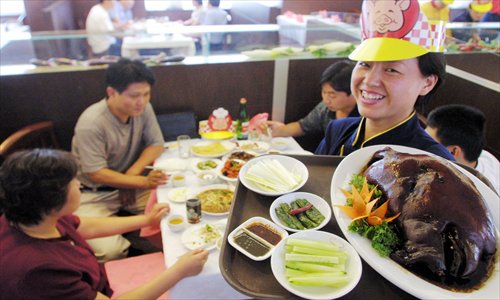Time to fatten up!

Watching one's weight is a common preoccupation in many countries, including China, where one often hears women talking about dieting no matter how trim they are. Despite this, there is a Chinese custom called tieqiubiao, literally meaning "add fat in autumn," that still remains popular today.
Agriculture in China began thousands of years ago. The tradition of living according to seasonal cycles has been passed down through the generations, and it is still an important part of life in China today. There remain many Chinese customs that stem from changes in the weather, most of which concern eating. Liqiu, the first day of autumn in the Chinese lunar calendar, one of the most important seasons in China, definitely has its traditions, and tieqiubiao is a crucial one.
In fact, the practice of tieqiubiao used to begin on Liqiu, whose date varies from year to year but often falls in August. (This year, Liqiu fell on August 7.) In recent years, the tradition of fattening up when cold weather approaches has been gradually pushed back later and later. A more health-conscious society whose standard of living has greatly increased in recent decades has resulted in many people following their doctors' advice that Li Qiu is a little bit early for tieqiubiao.
Born of necessity
Until recent years, most people couldn't afford to eat meat frequently, and in China before this more prosperous period, getting too fat was not much of a concern. Today, since high-fat foods like meat are easily within most people's budgets, more attention is paid to keeping waistlines down, not up. However, contrary to modern attitudes, traditional Chinese wisdom holds that if someone loses weight then he loses health.
In the past, people would weigh each other on Liqiu to see whether they had gained or lost weight since Lixia, the first day of summer. Someone whose weight decreased was said to have passed a kuxia (bitter summer). The antidote to kuxia is of course a diet geared toward gaining weight, upping one's intake of meat in particular. Hence the tradition of tieqiubiao was born.
Origins in the North
"The tradition of tieqiubiao has been most popular in Beijing, Hebei Province, and Northeast China, where it originated," said Chen Wutao, director of the Shaanxi Folk Custom Society. "[In these areas], the hot summer weather induces decreased appetite, and thus weight loss. So when the cool autumn comes, people find it necessary to 'eat the fat back.'"
According to Hong Ye, a traditional Chinese medicine (TCM) doctor at Zhu Jiang Hospital, people in the North follow this tradition in compliance with natural health principles.
"Tieqiubiao originated in the North because the weather there becomes cold very soon after Liqiu," Hong told the Global Times. "And in South China, the weather does not turn cold immediately after Liqiu, and instead it remains hot and wet for some time. If people in the South follow the custom of their northern compatriots, their stomachs may suffer from extra heavy burden."
Ai Jun, a writer and expert on folklore, agrees with Hong. "People living in the North, in areas both inside and outside the Great Wall, experience harsh cold in winter. Supplying the body with more fat, or energy, fortifies it against the upcoming winter," he told the Global Times.
But Ai believes there are other reasons that the tradition originated in North China. He pointed out that the Manchus, who reigned the country during the Qing Dynasty (1644-1911) and moved the capital to Beijing, were nomads from cold northern climes. As a result of this, Manchu's diets were filled with meat.
"Eating lots of meat is the tradition of Manchu people," said Ai. "Thus it is not surprising that the tradition of adding fat by eating meat popularized in those areas, especially in Beijing."
Further, Ai added, in northern regions, autumn associated with the harvest, unlike in South China, where locals enjoy harvests several times a year. For northerners, Liqiu's arrival is a reminder to work hard for a good harvest.
"People eat meat so they have enough energy for this physically demanding period," Ai told the Global Times.
In the past, people in the North ate various kinds of meat in the tradition of tieqiubiao on Li Qiu. Ordinary families would eat stewed pork, while wealthier families would have meat dumplings, chicken or duck, and even fish. Today, the menu varies.
People in South China don't tieqiubiao, but they do celebrate the coming of fall in their own way. People in Southeast China eat watermelon; in Hangzhou, Zhejiang Province, it is traditional to eat a peach and save the pit until New Year's Eve, when it is burned to ward off sickness in the coming year.
Be smart about it
Nowadays, as living standards in China have improved, "People no longer worry about losing weight during the summer, so tieqiubiao is more of a tradition than a necessity," Chen told the Global Times.
"Chinese will hold on to this tradition, but we should be smart about it," said Hong. In his opinion, even today, tieqiubiao serves a function.
"During summer, the body loses a fair amount of protein, vitamins and fat. Tieqiubiao can help your body get energy back. But if you eat too much and don't exercise, prepare to notice unwanted flab," he added.
According to TCM, countering dryness in the body is the key to health during the autumn season.
"It is dry in autumn [in the North] so nutritious, water-rich, heat-reducing, lung-moistening, sweet and sour foods should appear on your table more while spicy and fried foods should be avoided," said Wang Junjie of Beijing University of Chinese Medicine.
"Radishes, bean curd, sesame, Chinese chestnuts, lotus, soft-shell turtles, and duck are all good in autumn," Hong told the Global Times.